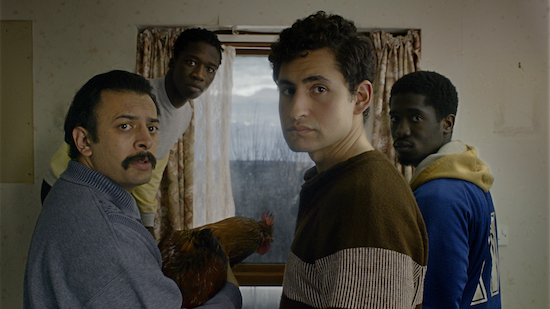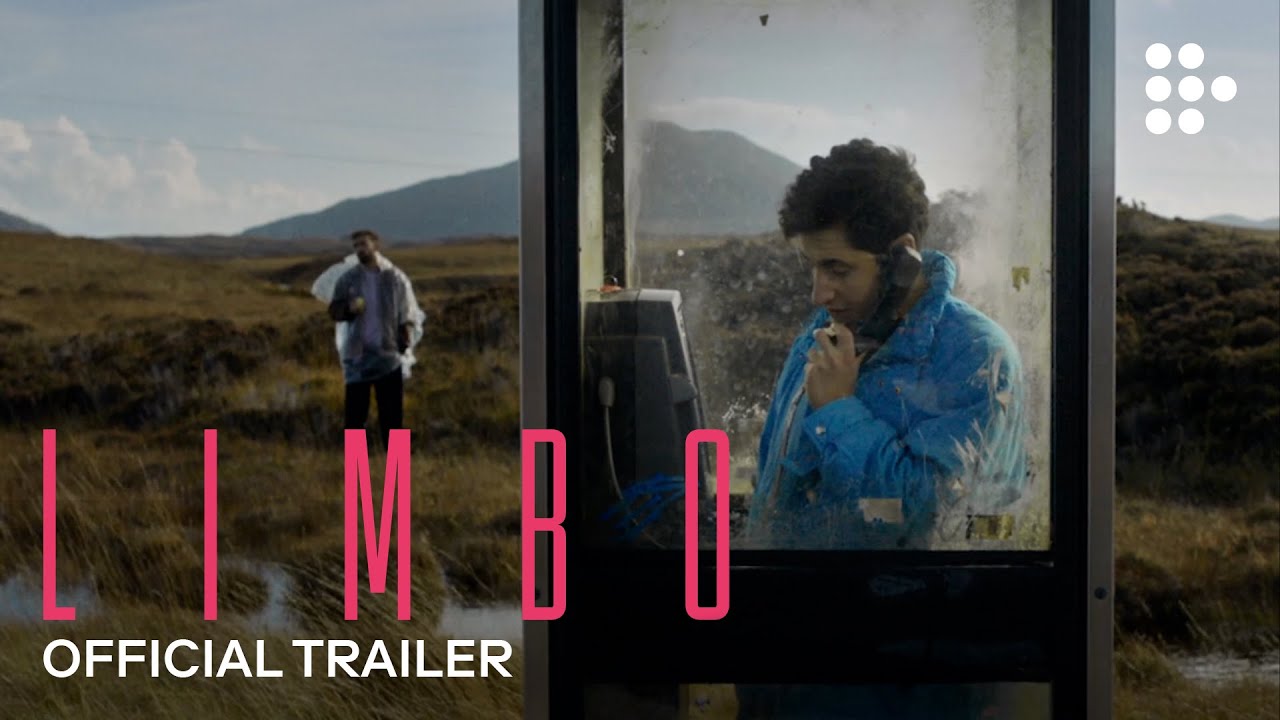Last summer, following a ghoulish period of renewed media interest in asylum seekers trying to cross the English Channel, YouGov conducted a poll on the British public’s attitude towards the refugee crisis. As boat upon boat floundered in the water and, on the other side of the world, the destruction in Syria continued to rage, 49% of those surveyed responded that they had little to no sympathy for refugees attempting to reach Britain from French camps.
By this point, production had long finished on Ben Sharrock’s sophomore film Limbo, which was intended to premiere at the ultimately cancelled Cannes Film Festival earlier that year. Yet it is difficult not to read his absurdist refugee drama as a response to this ongoing and increasingly entrenched culture of dehumanisation. Following Omar (Amir El-Masry), a soft-spoken Syrian musician who finds himself on a remote Scottish island awaiting the results of his asylum claim, Limbo is striking in its use of offbeat humour as a means towards compassion rather than mockery, and for its sustained emphasis on the affective experience of asylum seekers navigating the UK’s increasingly bizarre and inhospitable systems of entry.
Sharrock’s freshman feature was the 2015 zero-budget Spanish relationship comedy Pikadero, and here he builds on the striking visual language that characterised his directorial debut. The filmmaker’s cinephilic influence is undeniable: drawing on inspirations as diverse as Elia Suleiman, Jacques Tati, and Yorgos Lanthimos, his works are markedly the creation of a filmmaker who loves films, who sees cameras and performance and production design as tools of precision within cinema’s empathy machine.
At its heart, Limbo is an interrogation of whose narratives we tell and how we choose to tell them, a rejection of the ways in which our society deliberately hinders paths towards understanding and collectivity. In one key scene, Omar stands on a frozen rural road, demanding of one of the islanders in Arabic: “What do you see?”. Sharrock’s craft asks us to reorient our own gaze, to take the familiar and the desensitised and examine it anew. It is a narrative recentring that speaks to, and perhaps seeks to alleviate, the epidemic of indifference sweeping Europe. I spoke with Sharrock about the importance of foregrounding marginalised perspectives, his affinity for Middle Eastern cinema, and the violent legacy of the UK’s hostile environment.
The Quietus: Let’s rewind to the start of the journey: how did the idea for Limbo come about?
Ben Sharrock: It stems back to my undergraduate degree, which was in Arabic and politics. I spent my third year in Syria studying in Damascus and it was really formative: I tried to integrate as much as possible and joined the Damascus rugby team and got involved in theatre as well. And then I went on to film school and ended up going out to refugee camps in southern Algeria and working with an NGO there on a project about identity – I wrote a short film that we wanted to make but we ended up not being able to go back because the insurance said it was too dangerous. But the refugee crisis was becoming more and more prevalent as the conflict in Syria continued, and I was still in touch with friends there, and I just had this real desire to write a screenplay about the subject. It basically started off as this list of things to avoid.
What was on the list?
At the top was using Western characters as a vehicle to tell a story about refugees – I really wanted the refugee characters front and centre of the film. Other films about refugees are so often told from Western characters’ perspective, but I feel like we can relate directly to refugee characters, so why wouldn’t we? And then another thing was not sensationalising the subject matter. I wanted to find a way to tell a simple human story set against the backdrop of this big topic, rather than the topic itself being at the forefront.
So much of the film is about stillness, thematically but also aesthetically. Did you always know that you would use that visual style for this story?
I have, I suppose, certain stylistic sensibilities in that when I’m writing, I’m imagining every scene as I would direct it. That’s built into the way that I see films, so the writing and direction go very much hand-in-hand. And because I put a lot of priority on form, I’m thinking all the time about how to bring as much cinematic language into the imagery as possible, and how that can enhance the journey of the characters. In Limbo, the static nature of the film relates directly to the characters being stuck. We had a lot of imagery related to the idea of a journey: these roads that just extend and seem to go on forever and you don’t know where they lead.
You’ve said before that you’re very influenced by Elia Suleiman. I watched It Must Be Heaven recently and the similarities with Limbo are really noticeable: the way you both block things, and the way that the camera almost lingers. Would you say that Middle Eastern filmmaking is generally a big influence on your style?
It really is. When I came back from my year abroad, I ended up taking a module on Middle Eastern cinema and that was when I discovered all of this Iranian cinema and Arab cinema and discovered Elia Suleiman in quite quick succession, actually: it was Elia Suleiman’s In the Time That Remains that I first saw and then Eran Kolirin The Band’s Visit, I think. It completely changed my understanding of what cinema could be, but it also made entire sense to me, somehow. I remember thinking, this is in me – I want to be a film director because this is me. Iranian cinema, as well, in terms of its use of allegory and metaphor – it just spoke to me completely.
And when I went on to make films, I understood as I was writing that that’s just how I see everything. It wasn’t so much that I was looking at Elia Suleiman’s work and going, “Hey, I’m going to copy that.” It was that I also see in this planimetric way. I think the other thing that stood out with Elia Suleiman was the way that he could treat a serious subject matter and use humour to do that. There was the visual element, but there was also the unusual way he would approach these big political topics that really interested me.
Limbo definitely also uses comedy to evoke heavy themes of dislocation and isolation. How did you strike this balance between comedy and tragedy?
A lot of it was in the research. We spoke to people who have been through the asylum system and almost asked their permission to use humour with this subject matter, and the feedback we got was really positive. After that, it was about looking at how every single aspect of the production could be used to create this undertone. The lens, the cinematography, the production design, the use of colour…all these little things balance each composition to create a humorous undertone. And then working with the actors in the rehearsal and hearing the words out loud for the first time, we’d work to level the balance: maybe the performance would push the humour in one moment whereas in another, the composition or the production design or cinematography would push it while the performances are played very straight. There are points where there would even be a hat that was too colourful and it would make the composition feel too playful. So it would be a case of taking that hat out.
This is very much a film about the refugee experience and you’ve talked about wanting to speak to that, but it also feels like a distinctly Scottish film – it’s the first feature to be shot entirely on Uist. I’m interested in the way you approach the Scottish landscape: it’s been historically incredibly romanticised and carries very specific connotations of home and nationhood, but here it is used as a space to gatekeep.
At the forefront for me was, as you say, this romanticisation of Scotland, and wanting to try something different. I wanted to look at Scotland in a new way and create images that we might not have seen so frequently before.
One of the key things that I was looking for is somewhere that, metaphorically speaking, could be purgatory. More than it being a Scottish island, it was about creating this purgatorial space, and then building the images of the world to speak both to this metaphor and also to Omar’s emotional journey. So we focused on this idea of roads and the horizon line that we could always see. And then also the elements on the island and how it’s constantly being lashed by the wind and the rain, and there’s no way to escape from that.
Creatively, it became not so much about it being Scotland – even though the concept is a group of asylum seekers who are sent to a remote Scottish Island – but about creating this strange story world manufactured as a purgatorial space. You see that in the depiction of the locals even, because it’s not about them being islanders: they’re deliberately from England, from Denmark, lots of different places. It becomes about their attitudes as part of a Pan-European response to the refugee crisis.
It was after you wrote and shot this film that Priti Patel suggested the idea of establishing processing centres on remote British islands. Obviously Limbo wasn’t made in response to that particular idea, but to what extent is it a response to the broader hostile environment?
It’s really interesting because Priti Patel just moved forward with those proposals yesterday. There’s even been ideas of putting asylum seekers on abandoned oil rigs and on ferries, and then Ascension Island as well; ideas that come, really, from this process of dehumanisation and othering of refugees and asylum seekers.
When I set out to make Limbo, I [was aiming] for a balance of social realism and surrealism. The concept was, in part, inspired by the reality that refugees have been sent to some of the Scottish islands, but they have refugee status so their circumstances are very different to asylum seekers. But the other reality is that in a lot of European countries, asylum seekers are sent to remote environments to wait for their asylum claims. So I was trying to marry those two realities and create this fictional concept that even at the time in my head was quite absurdist.
It’s quite strange, because I wanted it to be this bizarre premise and now it’s something that’s actually real. It speaks to the absurdity of how our government and other governments can treat asylum seekers and the absurdity of the asylum process. So yes, it started out being absurd. Unfortunately, we’re now at a point where absurdities are becoming reality.
Limbo is in UK cinemas from 30 July
This interview has been edited and condensed for clarity.



